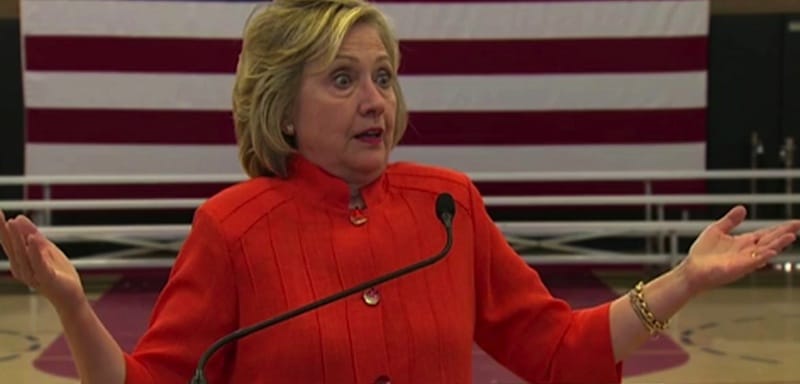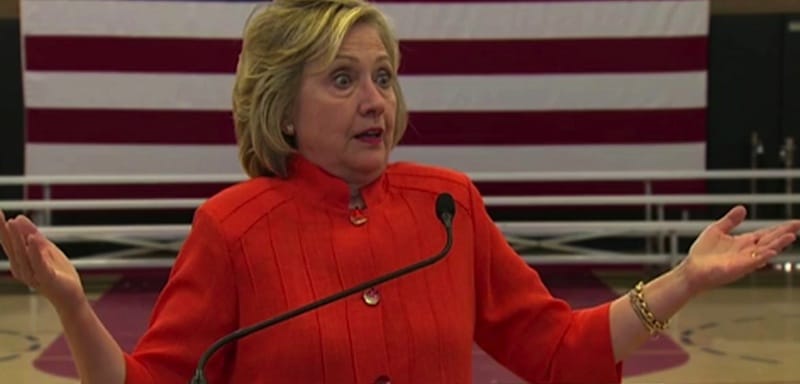I was on NPR yesterday on the Diane Rehm Show to discuss the Clinton email scandal. Appearing on the show was Brian Fallon, spokesperson for Hillary Clinton, who offered a new and rather implausible spin on the worsening scandal. Fallon said that Clinton was relying on her knowledge that Colin Powell used a personal email account as the reason that she thought her server was approved.
Here is what Fallon said in response to questions from Rehm:
I think that, as she has sought to explain in the multitude of interviews she’s done in the last few days since the report has come out, there was — and this is backed up in the IG report — one of her predecessors, Secretary Powell, had used personal email exclusively.And so she felt that in setting up her arrangement, that since his was approved, that hers was similar enough that it would be approved, too.
As I noted at the time, this is a new explanation. After the report said uncategorically that Clinton never asked for approval and would never have received approval for her unsecure personal server, she has switched from claiming that her server was “allowed” to she “believed it was allowed.”
First, this does not square with repeated concerns raised by security staff that were dismissed by Clinton aides. Second, it does not square with policies signed by Clinton herself telling people not to use personal email for State Department business. Finally, it does not square with the fact that Clinton resisted accepting a secure cellphone and was repeatedly seen using her Blackberry on the seventh floor of the State Department, a secure area (a major breach of security).
However, the biggest problem is that the new spin suggested that Clinton knew that Powell had used personal email years before her tenure. That seems highly dubious. Indeed, Clinton only started discussing the Powell emails after a disclosure from the State department that it found two classified emails had been sent by Powell (emails retroactively identified as classified). Now the campaign is claiming that Clinton knew the details of Powell’s email system (in the early days of email use) and was relying on that knowledge.
Of course, this is precisely the type of new information that the State Department was seeking in its investigation. Clinton repeatedly assured the public that “I’m more than ready to talk to anybody, any time. I’m happy to answer any questions that anybody might have. Any time you want to talk to me, here I am.” That was untrue, as we now know. What is most striking is that the State Department was trying to get to the bottom of a potentially serious national security breach. Yet, Clinton has refused (and her top aides refused) to answer questions.
Fallon address this in our discussion with an equally implausible spin: ” our campaign feels that this issue has been well litigated and fully aired in the press over the last year so that there’s probably no such thing at this point, as a low information voter, when it comes to factoring in her email use.” Yet, Clinton has been refusing to discuss the email beyond the same few lines insisting that it was approved and allowed by the State Department — which is now known to be untrue. She further insisted that she would answer all questions by investigators, which is also untrue. The State Department was trying to find out the scope of the breach of security and the violation of procedures — questions needed to safeguard national security. Clinton refused to help them. Thus, this suggestion that she relied on her knowledge of the email system used by Powell was never given to the State Department and never subjected to scrutiny.
The interview also featured media consultant and Clinton supporter Hillary Rosen who offered a rather odd justification that Clinton cannot be faulted for failing to comply with federal rules and Department guideline due to such countervailing priorities as wedding planning:
“It’s a pain to go through and change everything over. And I think, from her perspective, she was planning a wedding and she was going through, you know, family issues and the like. And she thought, well, why am I going to subject all of that to State Department scrutiny? I’m just going to send everything that’s important to my staff and it will be archived that way.”
As you might image, wedding planning is not a recognized exception to either classification rules or the Federal Records Act.
In another rather curious moment, Rosen insisted that “I do not think that she has a trust problem that has dogged her.” When I noted that Clinton has record lows for trustworthiness, I was asked to give examples of where she has changed her position. I noted her change on same-sex marriage and trade deals. The response from Rosen was outrage: “Because I’m a lesbian and how dare you.” What is odd is that Rosen then immediately recognized that Clinton had changed her position but insisted “You know, if every politician who took a position 20 years ago stuck with that position, we would not have any equality today.” Of course, many of us long supported same-sex marriage when politicians like Clinton insisted that such marriages could not be allowed on moral grounds. (Indeed, Clinton herself acknowledged that she took too long to change her position . . . at least in a comedy sketch). However, it appears that even mentioning that Clinton changed her position is now deemed as offensive.
None of this means that Clinton should be or will be criminally charged — or her aides charged. However, what is clear (in my view) is that her past statements were demonstrably untrue. Moreover, her refusal to cooperate with the State Department investigation placed political and personal interests over the interests of national security. These are questions that need to be fully answered and should have been answered without delay. Yet, the Clinton campaign continues to spin the facts and create new layers of implausible defenses.
Reprinted with permission from JonathanTurley.org.


